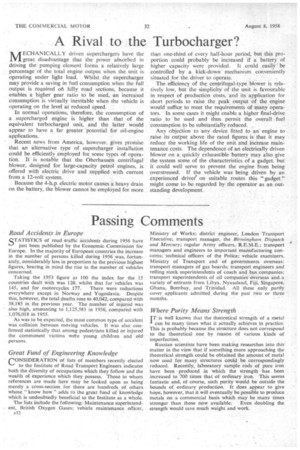A Rival to the Turbocharger?
Page 34

If you've noticed an error in this article please click here to report it so we can fix it.
ECHANICALLY driven superchargers have the great disadvantage that the power absorbed in driving the pumping element forms a relatively large percentage of the total engine output when the unit is operating under light load. Whilst the supercharger may provide a saving in fuel consumption when the full output is required oft hilly road sections, because it enables a higher gear ratio to be used, an increased consumption is virtually inevitable when the vehicle is operating on the level at reduced speed.
In normal operations, therefore, the consumption of a supercharged engine is higher than that of the equivalent turbocharged unit, and the latter would appear to have a far greater potential for oil-engine applications.
Recent news from America, however, gives promise that an alternative type of supercharger installation could be efficiently employed for some types of operation. It is notable that the Oberhausen centrifugal blower, designed for large-capacity petrol engines, is offered with electric drive and supplied with current from a 12-volt system.
Because the 4-h.p. electric motor causes a heavy drain on the battery, the blower cannot be employed for more than one-third of every half-hour period, but this proportion could probably be increased if a battery of higher capacity were provided. It .could easily be controlled by a kick-down mechanism conveniently situated for the driver to operate.
The efficiency of the centrifugal-type blower is relatively low, but the simplicity of the unit is favourable in respect of production costs,. and its application for short periods to raise the peak output of the engine would suffice to meet the requirements of many operators. In some cases it might enable a higher final-drive ratio to be used and thus permit the overall fuel consumption to be substantially reduced.
Any objection to any device fitted to an engine to raise its output above the rated figures is that it may reduce the working life of the unit and increase maintenance costs. The dependence of an electrically driven blower on a quickly exhaustible battery may also give the system some of the characteristics of a gadget, but it could well serve to prevent the engine from being overstressed. If the vehicle was being driven by an experienced driver" on suitable routes this " gadget " might come to be regarded by the operator as an outstanding development.




































































































